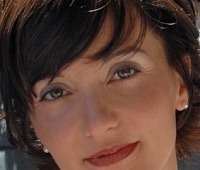|
Invited Talk: Professor Elisa Giaccardi, Universidad Carlos III de Madrid
 June 14, 2010 kl.13.00 – 14.30 June 14, 2010 kl.13.00 – 14.30
IT-Parken Katrinebjerg, Wiener-bygningen, lok 026
Heritage matters are starting to emerge as an important domain for interaction design. Yet we are often stuck with traditional museological frameworks, failing to understand the nature of heritage as cultural process. In this talk I will argue that the means of heritage engagement and production are built not only in space (e.g., the museum exhibition, the heritage site or the natural environment) but also—naturally—over time, where the past can be projected in the present and in the future.
I will explain how this perspective foregrounds the dimension of time and harnesses its tensional flow as it aids in our ability to experience, remember, and imagine. I will show how dialogical structures of conversation capable to articulate past, present, and future experiences might be a useful conceptual resource for interaction design work in the heritage domain. I will also discuss how this perspective can facilitate new ways of understanding design processes focused on the social and cultural aspects of human experience, and promote new design sensibilities.
Elisa Giaccardi is Visiting Professor at the Universidad Carlos III de Madrid (UC3M), where she is affiliated with the Department of Computer Science and the Institute for Culture and Technology. Prior to her position at UC3M, she was a Senior Research Scientist at the University of Colorado, Boulder. She holds a BA in Modern Humanities, a MA in Media and Communication, and a PhD in Science, Technology and Art Research. Elisa´s work in cultural informatics revolves around the construction and meaning of cultural heritage in the age of information technology. Her contributions to this subject comprise research and design work on collective memories, affective geographies, and civic curatorial practices. She is the recipient of a US National Science Foundation grant investigating use and impact of social technologies in support of sustainable natural heritage practices. Tags: cultural heritage | people | talk |


 June 14, 2010 kl.13.00 – 14.30
June 14, 2010 kl.13.00 – 14.30
